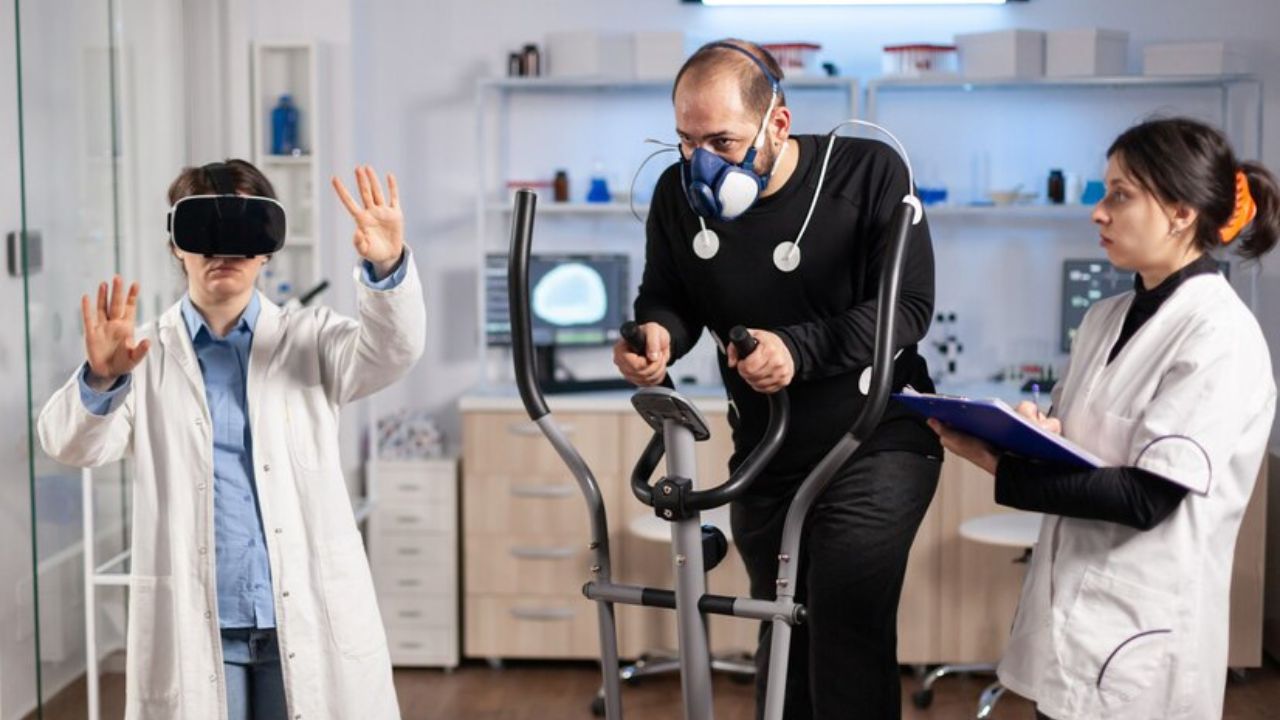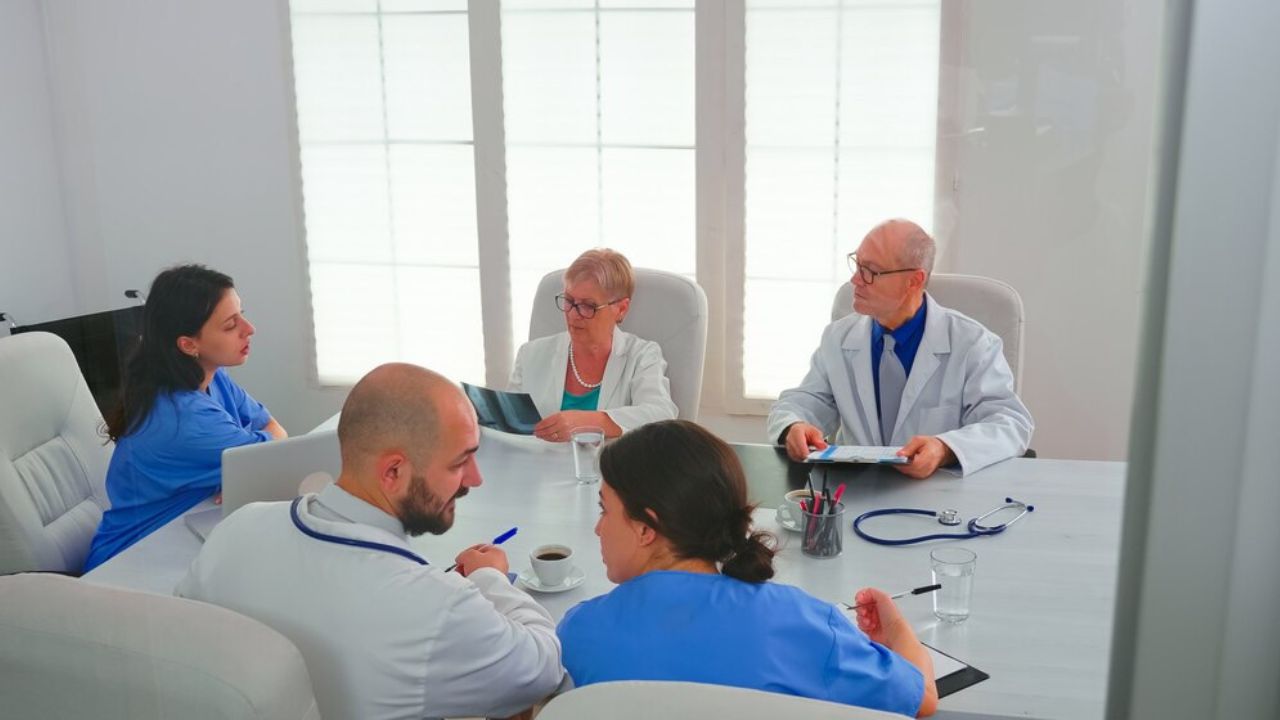HEALTH
Embracing Innovative Approaches in Orthopedic Care

Introduction to Orthopedic Innovations
Orthopedic care has undergone a transformative journey, continually evolving to meet the dynamic needs of patients. Modern advancements have propelled the field, allowing for more precise, effective, and efficient methods to treat musculoskeletal disorders. Innovative approaches within orthopedics are reshaping how we diagnose, treat, and rehabilitate conditions such as arthritis, fractures, and other bone and joint disorders.
Staying at the forefront of medical innovation is imperative. Orthopedics, a field directly impacting patients’ mobility and quality of life, greatly benefits from such advancements. Integrating new technologies not only improves care quality but also optimizes recovery time and reduces the invasiveness of treatments. Through continuous innovation, healthcare providers offer robust solutions that enhance patient satisfaction while maintaining efficacy and safety standards.
Advancements in Imaging Technologies
Introducing cutting-edge imaging technologies has brought a new dimension to orthopedic diagnostics. Technologies such as 3D imaging, digital tomosynthesis, and next-generation MRI allow orthopedic specialists to visualize bones and joints with unprecedented clarity. These advancements provide critical insights, aiding in the thorough analysis of conditions and precise planning of surgical procedures. Institutions like OCC Ortho exemplify the integration of leading-edge technology with patient-centric care models, marking a significant breakthrough in healthcare delivery.
The impact of these imaging advancements is particularly notable in planning complex surgeries, such as joint replacements and reconstructions, where precision is paramount. Enhanced imaging facilitates better preoperative planning and can predict potential challenges during surgery, thus minimizing complications and promoting successful outcomes.
Minimally Invasive Surgical Techniques
Emerging as a preferred option in orthopedic surgery, minimally invasive techniques have redefined patient care. These procedures incur less trauma than conventional surgeries by employing small incisions and specialized instruments. The benefits of minimally invasive surgery extend beyond reduced visible scarring; patients experience faster recovery, less postoperative pain, and a lower risk of complications. Surgeons are increasingly adopting these methods, particularly in spine and knee surgeries, where minimizing tissue damage can substantially improve postoperative mobility and comfort. As noted by the Mayo Clinic, utilizing advanced imaging techniques significantly reduces the risk of misdiagnosis, ensuring that treatments are appropriately targeted and personalized to individual needs.
Continued development in surgical tools and techniques is expected to enhance the outcomes of minimally invasive procedures further. The ability to perform complex operations with greater precision enables surgeons to restore function more effectively, highlighting the transformative power of these innovations in orthopedics.
The Role of Robotics in Surgery
Robotic-assisted surgery reshapes orthopedic techniques, bringing an unmatched level of precision to the operating room. Robotic systems aid surgeons in performing intricate surgeries, such as joint replacements, by providing enhanced dexterity and consistency. According to Johns Hopkins Medicine, robotic technology improves the accuracy of surgeries and significantly enhances patient safety and surgical outcomes.
These systems allow for precise implant placement, which is critical in avoiding alignment issues that can lead to long-term complications. With robotic assistance, surgeons can make real-time adjustments and receive instant feedback, optimizing the efficiency and effectiveness of procedures. As technology advances, the integration of robotics promises to refine surgical methodologies, ensuring consistently positive outcomes across diverse patient populations.
Regenerative Medicine in Orthopedics
Regenerative medicine, encompassing therapies like stem cell treatment and platelet-rich plasma (PRP) injections, offers profound potential in orthopedics. These treatments exploit the body’s natural healing mechanisms to repair damaged tissues, presenting a less invasive alternative to traditional procedures. In conditions such as osteoarthritis, regenerative techniques have effectively reduced pain and restored function without surgical intervention.
The field of regenerative medicine continues to evolve, driven by ongoing research and clinical trials. By providing customized treatment protocols, healthcare providers can better address individual patient needs, paving the way for personalized medicine within orthopedics. These advancements ensure a proactive approach to managing chronic musculoskeletal disorders while minimizing reliance on invasive procedures.
Technology-Driven Patient Engagement
Digital health technologies have given rise to new models of patient engagement in orthopedics. Wearable devices and mobile applications offer patients a platform to actively participate in their treatment plans actively, facilitating real-time rehabilitation progress and monitoring adherence. These tools empower patients to take control of their healthcare journeys, driving better outcomes and higher satisfaction levels.
Telemedicine, an increasingly popular component of patient care, expands access to specialist consultations, particularly in remote or underserved areas. This approach enhances convenience and provides a cost-effective alternative to traditional in-person visits. By leveraging technology, healthcare providers can deliver comprehensive orthopedic care, ensuring accessibility while maintaining high treatment standards.
Future Trends in Orthopedic Care
The orthopedic landscape is on the cusp of further transformation, with emerging trends focusing on personalized and predictive medicine. Ongoing research efforts are directed toward developing novel biomaterials, enhancing surgical precision through AI-driven systems, and refining regenerative therapies. These advancements reduce recovery times, improve functional outcomes, and elevate patient experiences.
As the discipline evolves, healthcare professionals and institutions must remain agile, embracing and integrating innovations into practice. The future of orthopedics promises a paradigm shift toward more personalized, technology-driven care, where integrating these advancements will result in unprecedented levels of precision, efficacy, and patient empowerment.
Conclusion
Innovative orthopedic care approaches have revolutionized how practitioners diagnose and treat musculoskeletal disorders. The field continues to deliver more effective, efficient, and patient-centered solutions by embracing cutting-edge technologies and methodologies. Institutions like OCC Ortho exemplify the dedication to harnessing these innovations for superior patient care. As the horizons of orthopedic treatment expand, the commitment to integrating new advancements will ensure that the benefits of these innovations are maximized, paving the way for a future of orthopedic care that is as dynamic as it is groundbreaking.
HEALTH
Milestones Achieved with PT

The milestones achieved through physical therapy often mark significant turning points in patients’ lives. These moments of progress inspire both patients and therapists alike:
- Walking Again After an Injury: A patient recovering from a severe ankle sprain celebrated the moment they walked unaided for the first time, a milestone made possible through dedication to their PT program.
- Returning to Work: For individuals with physically demanding jobs, regaining strength and endurance through PT means returning to their careers with confidence and capability.
- Competing in Sports Post-Rehabilitation: Athletes recovering from injuries achieve milestones like running their first race or competing in their sport again, thanks to customized rehabilitation plans.
If you’re looking for trusted professionals to help you achieve your goals, consider physical therapy Norman OK for comprehensive care and support.
For those seeking additional options, finding physical therapists near me ensures you’re working with experienced providers ready to guide you toward your own success story.
Start Your Journey to Success
Physical therapy has the power to change lives by addressing pain, improving mobility, and empowering patients to achieve incredible milestones. Whether you’re recovering from an injury, managing a chronic condition, or looking to enhance your athletic performance, PT offers a proven path to progress.
Take inspiration from these success stories and begin your journey today. With expert guidance and dedication, you too can achieve life-changing results through physical therapy.
HEALTH
Dr. Richard McDonnell Kansas City: A Pillar of the Medical Community

Kansas City is renowned for its vibrant culture, community-driven ethos, and cutting-edge developments in various fields – including healthcare. At the heart of this medical excellence stands Dr. Richard McDonnell Kansas City, a true pillar of the Kansas City medical community. With decades of dedication and countless contributions, Dr. McDonnell has earned a legacy of trust, innovation, and compassion.
This blog dives into the inspiring story of Dr. McDonnell, exploring his background, his key contributions to the community, and why his work continues to make a lasting difference.
A Brief Biography of Dr. Richard McDonnell
Born and raised in the Midwest, Dr. Richard McDonnell pursued medicine with a passion that stemmed from a deeply rooted desire to improve the lives of others. After earning his medical degree from a prestigious institution, Dr. McDonnell continued his medical training at leading hospitals and research centers, specializing in internal medicine and community health.
Through a combination of determination, empathy, and unmatched expertise, Dr. McDonnell became a prominent figure in Kansas City’s medical circles. His work touches nearly every corner of healthcare, from patient care to education and advocacy.
Key Milestones and Achievements
- Clinical Excellence: Dr. McDonnell has spent over 25 years providing top-tier clinical care, earning recognition for his diagnostic precision and patient-focused approach.
- Academic Contributions: A lifelong learner and teacher, he has mentored young physicians and contributed to medical publications to advance the collective knowledge of his field.
- Advocacy and Community Initiatives: Dr. McDonnell actively works to promote accessible healthcare for underserved populations in Kansas City, extending his support to numerous local health initiatives.
Dr. McDonnell’s Contributions to Kansas City Healthcare
Dr. McDonnell’s contributions go far beyond the examination room. Below are the key ways he’s helped shape the medical community:
1. Elevating Standards in Patient Care
Dr. McDonnell is celebrated for his empathetic approach to treating patients. Known for his ability to listen attentively and provide tailored treatment plans, his practice has become a beacon of patient-centered care in the Kansas City area. His philosophy emphasizes understanding the individual as a whole rather than focusing solely on their symptoms.
Impact in Numbers:
- Serves hundreds of patients yearly, many of whom report higher satisfaction and better long-term health outcomes under his care.
- Played a role in implementing new diagnostic tools, streamlining patient processes, and reducing time-to-treatment in clinical settings.
2. Pioneering Health Education Programs
Dr. McDonnell firmly believes in the power of education. He has partnered with local institutions to establish health workshops and educational programs designed to empower Kansas City residents to take control of their health. These programs focus on preventive measures, such as nutrition, exercise, and regular health screenings.
Some notable initiatives include:
- Public seminars on cardiovascular health and diabetes management.
- High school outreach programs that inspire future health professionals.
3. Advancing Medical Research
Beyond patient care, Dr. McDonnell has been involved in groundbreaking research projects aimed at improving diagnostic methods and treatment protocols for common diseases. His clinical trials and partnership with research universities in Kansas City have resulted in innovations that benefit patients nationally.
Dr. McDonnell’s key research interests include:
- Chronic disease management, specifically Type 2 diabetes and hypertension.
- Innovations in telehealth to expand access to care for rural populations.
4. Bridging Healthcare Gaps in Kansas City
Kansas City is not immune to the issue of healthcare disparities. Dr. McDonnell has played a significant role in addressing these issues by working with nonprofit organizations and local clinics to bring care to underserved communities. He’s led volunteer groups that offer free medical check-ups, vaccinations, and health education across vulnerable neighborhoods.
5. Mentoring Future Generations
Dr. McDonnell’s influence extends to his role as a mentor. He collaborates with universities and residency programs across Kansas City, sharing his knowledge with aspiring doctors. His emphasis on ethical, empathetic medicine has inspired countless young physicians to follow in his footsteps.
Why Dr. McDonnell’s Work Matters
Dr. McDonnell’s tireless efforts serve as a reminder of how individuals can profoundly affect their communities. His work addresses critical healthcare challenges, including:
- Preventive Care Awareness: Helping people adopt healthier lifestyles to avoid chronic diseases.
- Health Equity: Bringing quality healthcare to all demographics, regardless of socioeconomic status.
- Community Resilience: Inspiring local partnerships to create a more robust, patient-focused healthcare system.
The Future of Healthcare in Kansas City, Inspired by Dr. McDonnell
The legacy of Dr. Richard McDonnell Kansas City acts as a blueprint for the future of healthcare innovation in Kansas City. By focusing on community, education, and research, Kansas City can continue to raise the bar for medical excellence.
Whether working with patients directly or inspiring systemic change, Dr. McDonnell’s forward-thinking approach ensures a healthier, more connected Kansas City for future generations.
Final Thoughts
Dr. Richard McDonnell Kansas City name is synonymous with innovation, care, and community. His endless efforts—a perfect blend of compassion and science—continue to promote wellness and progress for thousands of individuals across Kansas City.
Want to stay updated on impactful figures in healthcare like Dr. McDonnell? We share stories, insights, and tips to help you take control of your health and thrive. Subscribe to our newsletter or explore more inspiring stories on our blog.
HEALTH
Finding the Ideal Elderly Care Provider for Your Loved One

Selecting the right elderly care provider involves assessing medical needs, personal preferences, and lifestyle compatibility. Key considerations include staff qualifications, available services, and the facility’s reputation. Visiting potential providers, asking detailed questions, and seeking recommendations can help ensure a supportive and nurturing environment, promoting well-being and comfort for your loved one.
Introduction
Empathy, love, and responsibility motivate us to ensure our loved ones receive the finest care possible as they age. Selecting the right elderly care provider involves navigating a complex landscape of diverse options and emotional stakes. This decision is crucial as it impacts not just the well-being of the loved one but also the peace of mind of the entire family. When considering professional services through avenues like elderly care Missouri or anywhere else, the emphasis should always be on careful planning and informed assessments. This article offers a comprehensive guide to uncovering the facets of elderly care, equipping you with insights necessary for making a choice grounded in your family’s unique needs and circumstances.
Understanding Your Needs
To choose the best senior care provider, it’s crucial to understand your loved one’s unique needs, including daily routines, personal preferences, and emotional well-being. This helps define the care structure and create a personalized plan to enhance their daily life quality. This understanding ensures that every decision aligns with their comfort, dignity, and security, making it a customized blueprint for improving their quality of life.
Types of Elderly Care Services
In-Home Care
In-home care is popular for seniors who value their comfort and familiarity as they age. It allows them to stay in their loved home while receiving personalized services. Caregivers assist with household chores, personal care, and medical tasks, fostering independence and continuity. This familiar environment significantly contributes to well-being as professionals adapt to evolving needs.
Assisted Living Facilities
Assisted living centers are ideal for elderly individuals who enjoy routine activities and social interaction. They provide a supportive environment, encouraging residents to engage in activities, develop friendships, and participate in community events. These facilities foster an active lifestyle while ensuring safety and support, allowing seniors to enjoy their time with fewer responsibilities. This level of engagement is particularly beneficial for those who enjoy peer company and organized activities.
Evaluating Caregiver Credentials
Entrusting the care of a loved one to another demands confidence in that individual’s capabilities, thus making it imperative to evaluate their credentials thoroughly. Check for formal certifications, professional training, and relevant experience in elderly care. Talking to references, particularly from families who have previously employed the caregiver, can provide firsthand insight into their reliability and competence. It’s wise to consult detailed guides, such as the one from the Senior Living Caregiving Guide, highlighting key attributes to seek in potential caregivers. These steps help ensure the caregiver possesses the skills needed for daily tasks and the sensitivity and emergency preparedness essential in caregiving roles.
Financial Considerations
Financial planning is an essential component in the decision-making process for elderly care. Understanding the costs of various options helps prevent unexpected expenses and ensures sustainable care. Investigate different cost structures, considering what aligns best with your financial capabilities. This includes checking possibilities for insurance coverage, government support, and any available community resources or subsidies. Addressing financial considerations simplifies long-term planning, allowing you to focus on maintaining consistent care quality rather than navigating financial strains.
Using Technology to Aid Care
Technology is pivotal in transforming how elderly care is delivered today. Innovative tools, such as wearable health monitors and medication management apps, enhance the safety and efficiency of care. These advancements enable real-time monitoring of vital signs, allowing caregivers and family members to respond swiftly to any changes. Utilizing technology in care not only aids in routine tasks but also provides peace of mind by facilitating constant communication and updates. Keeping up-to-date with the latest advancements in elderly care technology empowers families to harness these tools, optimizing the overall care experience while reducing the burdens on both the caregiver and care recipient.
Conducting Interviews with Potential Caregivers
Interviews are crucial for assessing a caregiver’s suitability beyond their professional qualifications. They should cover their experiences, problem-solving skills, and handling of critical situations. The interviews should also evaluate their interpersonal skills, communication style, and attitudes toward caregiving roles. These personal exchanges complement formal credentials, providing insight into the caregiver’s suitability and compatibility, which is vital for a successful caregiving arrangement.
Trial Periods and Monitoring
Implementing a trial period allows families to evaluate the suitability of a caregiver in real-world conditions. During this phase, monitor their interactions closely, looking for signs of rapport and adaptability to your loved one’s needs. Engage in open discussions with your loved one to understand their level of comfort and satisfaction. This trial period allows the caregiver and the family to make necessary adjustments, ensuring both parties are satisfied. Regular feedback and communication during this time can significantly fine-tune the caregiving arrangements to enhance mutual trust and assurance.
Long-Term Planning
Proactive long-term planning helps navigate health and personal preference shifts in your loved one’s care. Regularly re-evaluate the care arrangement to adapt to new medical needs, emotional changes, or lifestyle wishes. This approach ensures a high quality of life by maintaining consistency with evolving requirements. It is crucial for providing continuous quality care, meeting immediate needs, and preparing for future developments.
-

 BLOG8 months ago
BLOG8 months agoTribute Printed Pics: Top 10 Ways to Honor Loved Ones
-

 NEWS8 months ago
NEWS8 months agoNEWS JoTechGeeks: How to Stay Updated with the Latest News
-

 BLOG6 months ago
BLOG6 months agoThe //Vital-Mag.net Blog: Your Daily Dose of Inspiration
-

 ENTERTAINMENT9 months ago
ENTERTAINMENT9 months agoFreemoviesfull.cc: Ultimate Guide
-

 HEALTH9 months ago
HEALTH9 months ago2023-1954: Enhancing Health and Vitality
-

 TECH8 months ago
TECH8 months agoWww abithelp .com: Your Ultimate Online Assistance Platform
-

 HEALTH8 months ago
HEALTH8 months agowww healthsciencesforumcom: A Trusted Health Sciences Platform
-

 TECH9 months ago
TECH9 months agoWebtoon XYZ: A Journey into the World of Digital Comics
